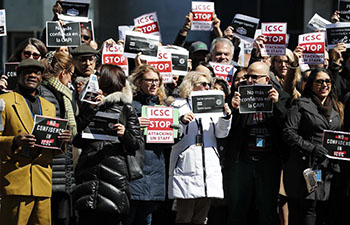SAN FRANCISCO, March 20 (Xinhua) -- San Francisco on the U.S. west coast banned the sale of fur clothing on Tuesday after the city's Board of Supervisors voted unanimously in favor of the prohibition, despite outcries from businesses.
The ban, to take effect on Jan. 1, 2019, applies to apparel and accessories featuring real fur, including coats, key chains and gloves. San Francisco is the biggest U.S. city that has adopted such a policy.
However, the prohibition doesn't apply to other animal products like leather or lambskin or wool, and second-hand shops could continue to sell used fur products. Violators of the ban could face penalties of up to 1,000 U.S. dollars.
The new law gave retailers a grace period until January 2020 to sell their fur products in their existing inventory if the fur order was placed before March 20, 2018.
"More than 50 million animals are violently killed each year around the world to support the fashion industry," Katy Tang, who introduced the fur sale ban legislation, said in a statement after the voting.
The legislation said the sale of fur products in San Francisco is "inconsistent with the City's ethos of treating all living beings, humans and animals alike, with kindness."
San Francisco Mayor Mark Farrell said he supports the legislation and plans to "sign it when it crosses my desk."
However, the fur industry opposed the city's decision and warned of a loss of millions of U.S. dollars and jobs.
The International Fur Federation and the Fur Information Council of America wrote a letter to the Board of Supervisors last week, saying the ban "would result in the loss of millions of dollars in tax revenues and jobs."
Humane Society International (HSI), the international division of the Humane Society of the United States that advocates animal welfare, applauded San Francisco's legislation Tuesday.
"San Francisco has today put itself on the map as a world-leading city in kind, progressive law making," said HSI CEO Kitty Block, hailing the ban "as an exciting and historic vote both for animals and compassionate consumerism."













